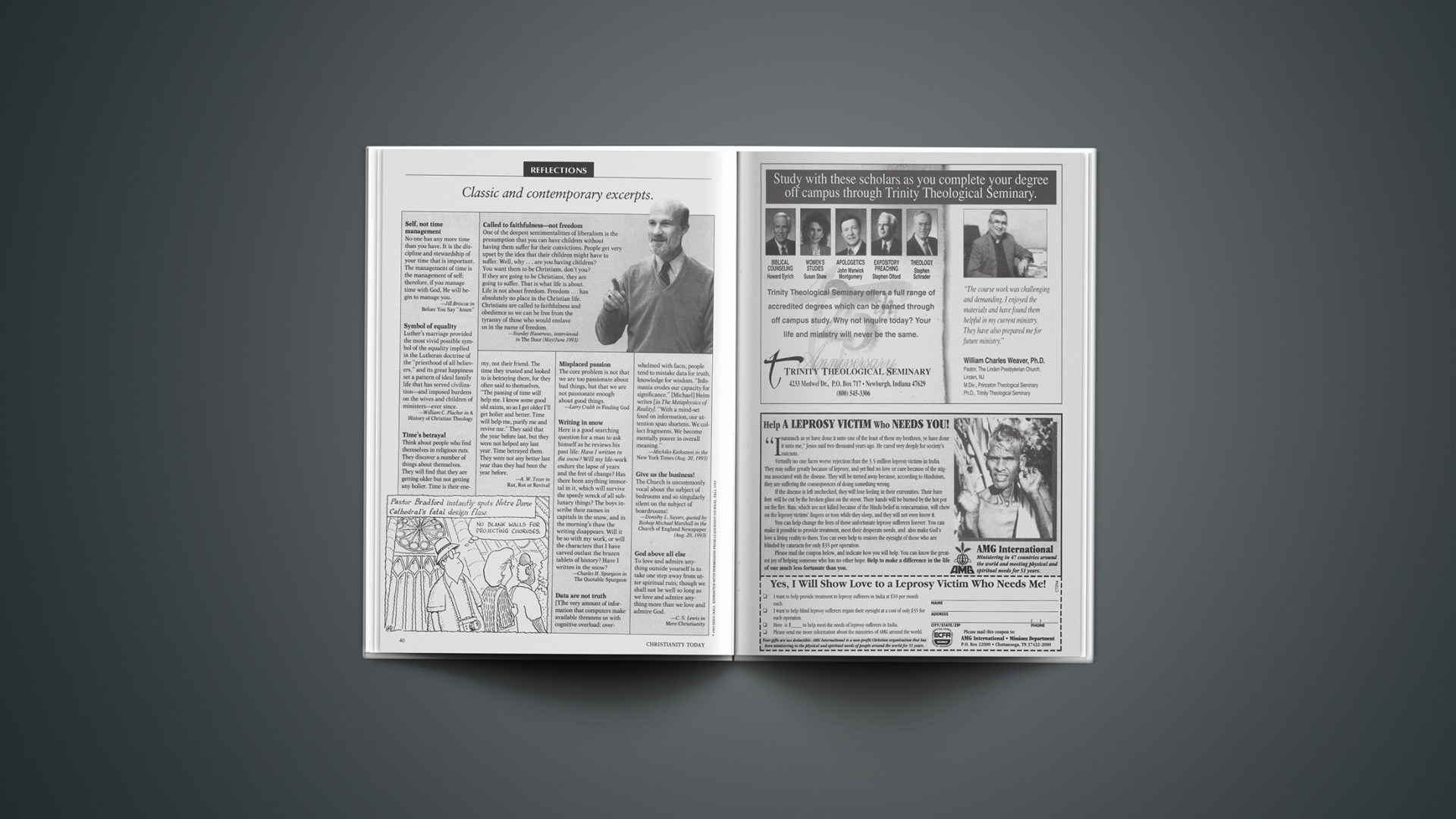Classic and contemporary excerpts.
No one has any more time than you have. It is the discipline and stewardship of your time that is important. The management of time is the management of self; therefore, if you manage time with God, He will begin to manage you.
—Jill Briscoe in Before You Say “Amen”
Luther’s marriage provided the most vivid possible symbol of the equality implied in the Lutheran doctrine of the “priesthood of all believers,” and its great happiness set a pattern of ideal family life that has served civilization—and imposed burdens on the wives and children of ministers—ever since.
—William C. Placher in A History of Christian Theology
Think about people who find themselves in religious ruts. They discover a number of things about themselves. They will find that they are getting older but not getting any holier. Time is their enemy, not their friend. The time they trusted and looked to is betraying them, for they often said to themselves, “The passing of time will help me. I know some good old saints, so as I get older I’ll get holier and better. Time will help me, purify me and revive me.” They said that the year before last, but they were not helped any last year. Time betrayed them. They were not any better last year than they had been the year before.
—A. W. Tozer in Rut, Rot or Revival
One of the deepest sentimentalities of liberalism is the presumption that you can have children without having them suffer for their convictions. People get very upset by the idea that their children might have to suffer. Well, why … are you having children? Your want them to be Christians, don’t you? If they are going to be Christians, they are going to suffer. That is what life is about. Life is nor about freedom. Freedom … has absolutely no place in the Christian life. Christians are called to faithfulness and obedience so we can be free from the tyranny of those who would enslave us in name of freedom.
—Stanley Hauerwas, interviewed in The Door (May/June 1993)
The core problem is not that we are too passionate about bad things, but that we are not passionate enough about good things.
—Larry Crabb in Finding God
Here is a good searching question for a man to ask himself as he reviews his past life: Have I written in the snow? Will my life-work endure the lapse of years and the fret of change? Has there been anything immortal in it, which will survive the speedy wreck of all sublunary things? The boys inscribe their names in capitals in the snow, and in the morning’s thaw the writing disappears. Will it be so with my work, or will the characters that I have carved outlast the brazen tablets of history? Have I written in the snow?
—Charles H. Spurgeon in The Quotable Spurgeon
[T]he very amount of information that computers make available threatens us with cognitive overload: overwhelmed with facts, people tend to mistake data for truth, knowledge for wisdom. “Infomania erodes our capacity for significance,” [Michael] Heim writes [in The Metaphysics of Reality]. “With a mind-set fixed on information, our attention span shortens. We collect fragments. We become mentally poorer in overall meaning.”
—Michiko Katkutani in the New York Times (Aug. 20, 1993)
The Church is uncommonly vocal about the subject of bedrooms and so singularly silent on the subject of boardrooms!
—Dorothy L. Sayers, quoted by Bishop Michael Marshall in the Church of England Newspaper (Aug. 20, 1993)
To love and admire anything outside yourself is to take one step away from utter spiritual ruin; though we shall not be well so long as we love and admire anything more than we love and admire God.
—C. S. Lewis in Mere Christianity










